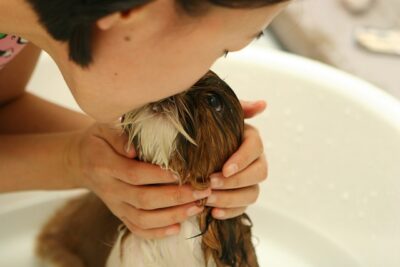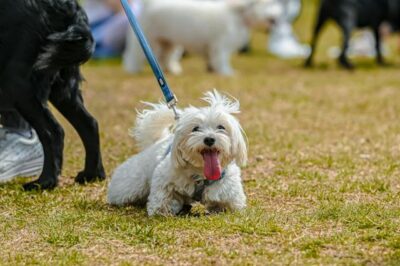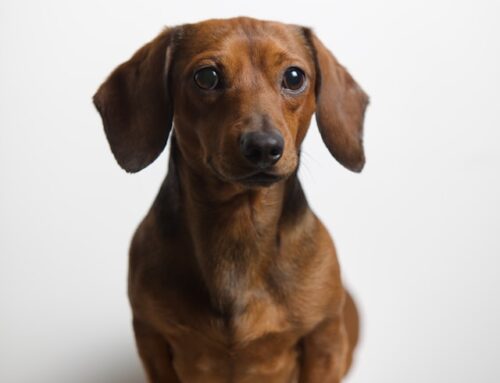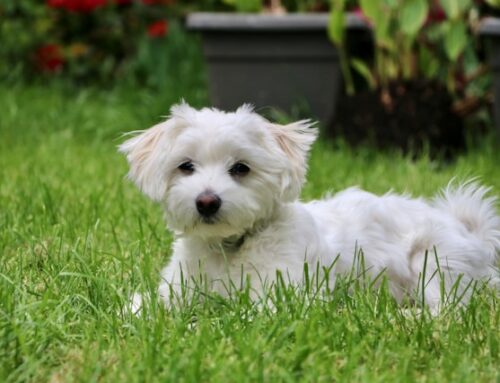Overview
- Introduction: Are Shih Tzu Hypoallergenic
- Understanding Hypoallergenic Pets
- Shih Tzu Breed Characteristics
- Allergens in Dog Breeds
- Shih Tzu and Dander Production
- Factors Influencing Allergic Reactions
- Grooming Practices for Allergen Control
- Choosing a Shih Tzu for Allergy Sufferers
- Common Misconceptions
- Shih Tzu Breeding Practices
- The Impact of Diet on Allergies
- Common Health Issues in Shih Tzu
- Gearing Up for Shih Tzu Ownership
- Grooming at Home: Tips and Tricks
- Training Shih Tzu for Allergy Sensitivity
- Shih Tzu-Friendly Living Spaces
- Conclusion
- FAQs: Navigating the Allergy Landscape with Shih Tzu
Introduction: Are Shih Tzu Hypoallergenic

The Allure of Shih Tzu as Pets
Pet lovers often find themselves enchanted by the adorable Shih Tzu breed, known for its charming personality and luxurious coat. However, there’s a lingering concern among potential owners – the pervasive issue of pet allergies. Many individuals, especially those who consider small dog breeds and allergy-friendly dogs, often wonder if Shih Tzus’ hypoallergenic.
This small dog breed holds a special place in the hearts of allergy sufferers due to their manageable size and perceived hypoallergenic qualities. As prospective owners weigh the pros and cons of different breeds, the Shih Tzu’s reputation as a charming and allergy-friendly companion becomes increasingly appealing for those seeking a delightful addition to their homes.
The Pervasive Issue of Pet Allergies
Pet allergies have become a widespread concern for many individuals, especially those who share their homes with furry companions. Among the various dog breeds, the Shih Tzu often emerges as a subject of interest when it comes to hypoallergenic qualities. For prospective pet owners, understanding the nuances of Shih Tzu puppies, Shih Tzu dogs, and their impact on dog allergies is crucial.

Understanding Hypoallergenic Pets
Defining Hypoallergenic Dogs
In the realm of pet ownership, the term “hypoallergenic” often surfaces, creating an expectation of an allergy-free experience. However, it’s crucial to demystify this term and recognize that hypoallergenic doesn’t equate to complete immunity from allergies. Instead, it indicates a lower likelihood of triggering allergic reactions in individuals sensitive to pet allergens.
Myth vs. Reality: Hypoallergenic Dog Breeds
The concept of hypoallergenic dog breeds has sparked much debate and curiosity. Are there truly dog breeds that can be classified as completely hypoallergenic? Let’s delve into the reality behind this notion and explore its connection to the Shih Tzu.
When considering Shih Tzus in the context of hypoallergenic pets, their unique coat becomes a focal point of discussion. Shih Tzus are often considered hypoallergenic due to the nature of their hair rather than fur. This distinction can impact the amount of pet dander released into the environment, potentially reducing the likelihood of triggering dog allergies.
However, it’s crucial to note that the term “completely hypoallergenic” may be a bit of a misnomer. No dog breed can guarantee absolute freedom from allergens, as individual reactions to pet dander can vary. Despite the hypoallergenic qualities associated with Shih Tzus, prospective owners, especially those with a history of dog allergies, should exercise caution and spend time with a Shih Tzu puppy or dog before making a commitment.

Shih Tzu Breed Characteristics
Shih Tzu’s Distinctive Features
Exploring the unique characteristics that set Shih Tzu apart from other dog breeds reveals more than just their irresistibly cute appearance. Beyond their endearing demeanor, the Shih Tzu boasts distinctive features that contribute to their charm and hypoallergenic potential.
Coat Texture and Length
At the heart of understanding the Shih Tzus’ hypoallergenic qualities lies in the intricacies of their coat. The American Kennel Club (AKC) recognizes the Shih Tzu as a breed with a luxurious double coat. The outer layer, composed of long, flowing tresses, often gives these dogs their regal and distinctive appearance. The undercoat, soft and dense, provides an extra layer of insulation.
The texture of the Shih Tzu’s coat is an essential factor in considering their hypoallergenic nature. Unlike breeds with fur, Shih Tzus have hair, which more closely resembles human hair. This unique characteristic impacts the amount of loose hair and dander released into the environment, potentially making them more suitable for individuals prone to allergies.
The length of the Shih Tzu’s coat, while undeniably beautiful, also requires regular grooming sessions to prevent matting and tangling. This grooming routine not only maintains their elegant appearance but also aids in managing loose hair and minimizing the dispersion of dander. Shih Tzu owners often find that diligent grooming practices contribute to a healthier coat and a more comfortable living environment for allergy-sensitive individuals.
In addition to their distinctive coat, Shih Tzus are known for other endearing features, such as their expressive, round eyes and characteristic “smushed” face. Their floppy ears add to their charm, requiring regular cleaning to prevent ear infections.

Allergens in Dog Breeds
Identifying Common Allergens in Dogs
Dog allergens are diverse and can include pet dander, saliva, and urine. Dander, tiny flecks of skin shed by dogs, tends to be a primary culprit in triggering an allergic reaction.
Saliva and urine can also contribute to allergies, although to a lesser extent. These allergens can become airborne and settle on surfaces, affecting both indoor and outdoor environments.
Shih Tzu Allergen Levels
Now, let’s focus on Shih Tzu and whether their allergen levels differ from those of other dog breeds. Shih Tzus are often considered a hypoallergenic dog breed, especially appealing to those seeking a small, allergy-friendly canine companion. The key distinction lies in the unique characteristics of the Shih Tzu’s coat, which may contribute to them producing fewer allergens compared to other breeds.

Shih Tzu and Dander Production
Dander: The Culprit Behind Allergies
Dander, a major contributor to an allergic reaction, is closely related to a dog’s skin and coat. Shih Tzus, being a hypoallergenic breed, are known to produce less dander than many other dogs. This is attributed to their hair-like coat, which tends to shed less and release fewer airborne allergens into the environment.
Examining Shih Tzu Dander
Taking a closer look at Shih Tzu’s dander production sheds light on why they are often considered suitable for allergy sufferers. The unique texture and length of their coat result in less dander being released, making Shih Tzus potentially more compatible with individuals prone to allergies.

Factors Influencing Allergic Reactions
Individual Sensitivity to Allergens and Allergic Reaction
Allergies vary widely from person to person, and understanding individual sensitivity is crucial, especially when considering Shih Tzu ownership. Some people may be more prone to allergic reactions, while others may have a milder response or none at all. Exploring how individual sensitivity plays a role in Shih Tzu allergies can provide valuable insights for potential owners.
Personal hygiene practices, such as regular handwashing and maintaining a clean living environment, are essential for individuals looking to prevent allergies. For those who may be more susceptible, exposure to pet dander, including that of Shih Tzus, could trigger allergy symptoms. This may manifest as difficulty breathing, particularly in individuals with respiratory sensitivities.
Considering the health of family members is crucial, as some people may be more prone to allergies than others. Creating pet-free zones within the home can offer a sanctuary for individuals allergic to Shih Tzus, providing a designated space where they can avoid potential allergens.
In some cases, people allergic to pet dander may explore allergy shots as a long-term solution to mitigate their immune response. Recognizing and addressing allergy symptoms promptly is key to maintaining a harmonious living environment for both Shih Tzu owners and those who may be more sensitive to allergens.
Shih Tzu Allergies: Severity and Frequency
The severity and frequency of allergic reactions to Shih Tzu can differ among individuals. While Shih Tzus are often considered hypoallergenic and produce fewer allergens, it’s essential for potential owners to assess the potential for allergic reactions in their specific case. Understanding the nuances of Shih Tzu allergies helps individuals make informed decisions about bringing these charming dogs into their homes.

Grooming Practices for Allergen Control
Shih Tzu Grooming Routines
One key aspect of managing Shih Tzu allergies revolves around grooming routines. Regular grooming practices can significantly reduce the presence of allergens, such as pet dander, in the environment. Shih Tzu owners, especially those concerned about potential skin irritation, should be aware of specific grooming routines tailored to minimize allergens.
This includes paying attention to the frequency of baths, brushing sessions, and overall coat maintenance. Engaging the services of a professional groomer can also be beneficial, as they are well-versed in techniques that not only keep the Shih Tzu’s luxurious coat in optimal condition but also help mitigate potential allergy triggers. By incorporating these grooming practices, Shih Tzu owners can create a comfortable and allergy-friendly environment for both themselves and their beloved small dogs.

Tools and Techniques for Reducing Allergens
Equipping oneself with the right tools and techniques is essential for Shih Tzu owners looking to minimize allergens and create a comfortable living space for both the pet and the allergy sufferer. Daily brushing, especially with high-quality grooming tools, can help trap pet dander and prevent allergen buildup. Professional groomers can also assist in managing allergies through their expertise in maintaining the Shih Tzu’s coat.
For a comprehensive approach to reducing allergens, incorporating tools like a high-quality air purifier and a vacuum cleaner with a HEPA filter can make a significant difference. These devices aid in eliminating airborne allergens, including outdoor allergens, and ensuring a cleaner living environment. Regular vacuuming with a HEPA filter-equipped vacuum cleaner can effectively remove loose hair and dead skin, common contributors to allergens in a home shared with a Shih Tzu.
Additionally, paying attention to the cleanliness of the pet’s bedding and the Shih Tzu’s bedding is crucial. Washing and maintaining these areas regularly can help minimize the accumulation of allergens that may trigger allergies in sensitive individuals. By implementing these measures, Shih Tzu owners can create a more comfortable and allergy-friendly space for both themselves and their furry companions.

Choosing a Shih Tzu for Allergy Sufferers
Testing Allergic Reactions
The decision to bring a Shih Tzu into your home, especially for allergy sufferers, requires careful consideration. Before committing to Shih Tzu ownership, it’s essential to learn how to effectively test for allergic reactions. Understanding your body’s response to interaction with these furry companions is a crucial step in ensuring a harmonious living environment.
Interacting with Shih Tzu before Ownership
Interacting with a Shih Tzu before making a commitment is a practical approach to gauge compatibility. Spending time with a Shih Tzu, whether through visits to breeders, a local shelter, or interacting with dogs owned by friends or family members, allows potential owners to observe any potential allergic reactions. This firsthand experience helps in making an informed decision about whether a Shih Tzu is the right fit for your lifestyle.

Common Misconceptions
Shih Tzus Hypoallergenic Mythology
Addressing common myths surrounding Shih Tzus’ hypoallergenic qualities is crucial to dispel any misinformation. While Shih Tzus are often considered hypoallergenic due to their unique coat, it’s important to separate fact from fiction and understand that no dog breed can guarantee complete immunity from allergens.
Addressing Popular Misbeliefs
Debunking prevalent misconceptions about Shih Tzu and allergies is essential for potential owners. By gaining accurate information, individuals can make informed decisions, ensuring a positive experience with their Shih Tzu without falling prey to common myths.

Shih Tzu Breeding Practices
Breeding for Reduced Allergens
Responsible breeding practices play a significant role in reducing allergens in Shih Tzu. Reputable breeders prioritize selecting breeding pairs with hypoallergenic traits, contributing to the overall health and well-being of the breed.
Responsible Breeding for Health and Allergies
Understanding the importance of responsible breeding for both the health and allergies of Shih Tzu is paramount. Reputable breeders focus not only on reducing allergens but also on breeding for the overall health and longevity of the breed, ensuring that Shih Tzus make excellent companions for individuals and families alike.

The Impact of Diet on Allergies
Nutrition and Allergies in Shih Tzu
Exploring the connection between nutrition and allergies in Shih Tzu reveals the importance of a well-balanced diet in maintaining overall health and potentially reducing allergic reactions.
Special Diets for Allergy-Prone Shih Tzu
For Shih Tzus prone to allergies, special diets tailored to their specific needs can make a significant difference. Consulting with a veterinarian to determine the most suitable diet for your Shih Tzu’s individual requirements is essential.

Common Health Issues in Shih Tzu
Correlating Allergies with Other Health Conditions
Examining the correlation between allergies and other health conditions in Shih Tzu highlights the importance of proactive healthcare for these furry friends.
Addressing Health Concerns for Potential Owners
Potential Shih Tzu owners need to be aware of common health concerns and how to address them. Regular veterinary check-ups, proper grooming, and attention to their unique health needs contribute to a happy and healthy life for your Shih Tzu.
In the journey of selecting a Shih Tzu, whether adopting an adult dog or bringing home a Shih Tzu puppy, thorough research, interaction, and understanding of individual health considerations will ensure a furry friend that not only fits into your lifestyle but also becomes a cherished family member.

Gearing Up for Shih Tzu Ownership
Preparing Your Home for a Shih Tzu
Welcoming a Shih Tzu into your home requires thoughtful preparation to ensure a comfortable and safe environment for your new furry companion. From securing living spaces to providing cozy spots for rest, practical tips can help you prepare your home for the arrival of a Shih Tzu.
Essential Supplies for Shih Tzu Care
Optimal care for your Shih Tzu involves having the right supplies on hand. A checklist of essential items, from grooming tools to nutritious food, ensures that you’re well-equipped to meet the needs of your new family member and provide them with the best care possible.
Grooming at Home: Tips and Tricks
DIY Grooming for Allergy Control
For allergy control, mastering the art of DIY grooming is key. Learn effective tips and tricks to groom your Shih Tzu at home, reducing the presence of allergens in their coat and creating a healthier living environment.
Establishing a Grooming Routine
Consistency is crucial in managing allergies, and establishing a regular grooming routine is paramount. Discover the importance of maintaining a consistent schedule for grooming sessions to effectively manage allergens and keep your Shih Tzu’s coat in top condition.

Training Shih Tzu for Allergy Sensitivity
Positive Reinforcement Techniques
Implementing positive reinforcement techniques is essential when training your Shih Tzu for allergy sensitivity. These techniques not only foster a strong bond between you and your furry friend but also help create a positive association with grooming routines and allergy management.
Behavioral Training for Allergy Management
Explore effective behavioral training strategies to manage allergies in your Shih Tzu. From acclimating them to grooming practices to encouraging positive behavior in allergy-friendly living spaces, behavioral training plays a crucial role in ensuring a harmonious relationship between you and your Shih Tzu.
Shih Tzu-Friendly Living Spaces
Creating an Allergy-Friendly Environment
Tips for creating a Shih Tzu-friendly living space go beyond grooming and extend to your home environment. Discover ways to minimize allergens, such as choosing hypoallergenic bedding and utilizing air purifiers, to create a comfortable setting for both you and your Shih Tzu.
Home Modifications for Allergy Sufferers
For allergy sufferers, making necessary home modifications is key to ensuring a comfortable living environment. From designating specific areas for your Shih Tzu to investing in easy-to-clean furniture, these modifications contribute to a healthier home for everyone.

Conclusion
Summarizing Shih Tzu Hypoallergenic Traits
In conclusion, Shih Tzus, with their hypoallergenic traits and unique double coat, stand out as a potential choice for allergy sufferers seeking a furry companion. Their distinct characteristics, when coupled with informed care and training, make them delightful additions to households mindful of allergies.
Encouraging Informed Shih Tzu Ownership
Encourage informed decision-making when considering Shih Tzu ownership, keeping allergies in mind. By spending time researching, preparing your home, and implementing effective grooming and training practices, you pave the way for a rewarding and allergy-conscious relationship with your Shih Tzu—a furry friend destined to become a cherished family member.
Understanding that Shih Tzus are often considered more hypoallergenic due to their minimal shedding can be a crucial factor in creating a comfortable and harmonious environment for both you and your new pet. Explore our selection of Shih Tzu puppies available in Florida and surrounding areas, and embark on the journey of bringing home your newest family member.
FAQs: Navigating the Allergy Landscape with Shih Tzu
- Are Shih Tzus Hypoallergenic?
- Answer: While no dog breed is completely hypoallergenic, Shih Tzus are often considered more allergy-friendly due to their minimal shedding and manageable coat. However, individual reactions vary.
- Are Shih Tzus Hypoallergenic for Severe Allergies?
- Answer: Shih Tzus may be suitable for individuals with mild to moderate allergies, but those with severe allergies should spend time with a Shih Tzu beforehand to assess their compatibility.
- Do Shih Tzus Trigger Allergies Like Some Other Dogs?
- Answer: Shih Tzus tend to produce fewer allergens than some other breeds, making them a potential choice for individuals with allergies. However, it’s crucial to spend time with one to gauge personal reactions.
- Can Shih Tzus Coexist with Other Pets?
- Answer: Shih Tzus generally get along well with other pets. Introducing them gradually and monitoring interactions can help ensure harmonious relationships.
- Is There Such a Thing as a Completely Allergy-Free Dog Breed?
- Answer: No dog breed is entirely allergy-free. Shih Tzus are considered more hypoallergenic due to their coat type, but individual reactions depend on factors like personal allergies and sensitivity.
- Do Shih Tzus Shed Less Than Other Breeds?
- Answer: Yes, Shih Tzus are known for minimal shedding. Their coat requires regular grooming to prevent matting and reduce the amount of loose hair in the environment.
- Can Individuals with Allergies Spend Time with Shih Tzus?
- Answer: Individuals with allergies should spend time with Shih Tzus before bringing one into their home to assess any potential allergic reactions.
- Are Shih Tzus Recommended for Families with Other Breeds of Dogs?
- Answer: Shih Tzus can generally adapt well to families with other breeds, but gradual introductions and monitoring interactions are essential for a smooth integration.




